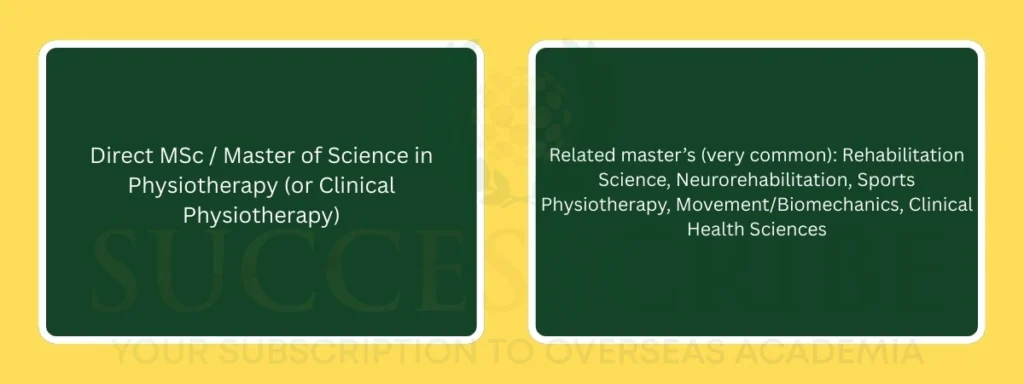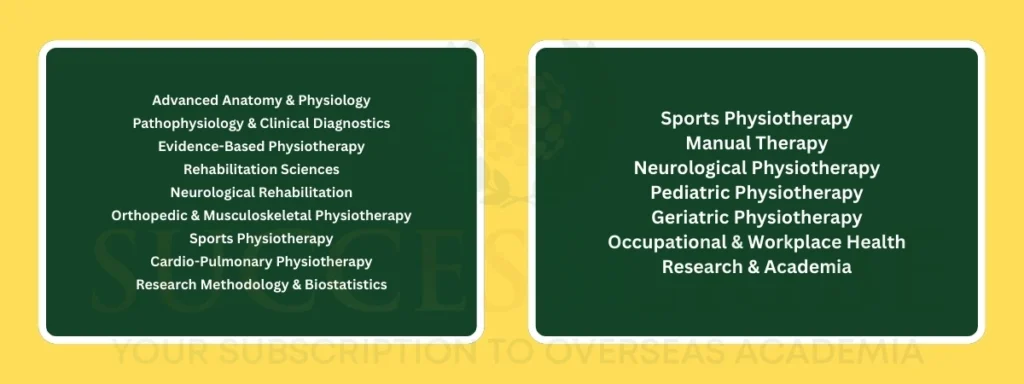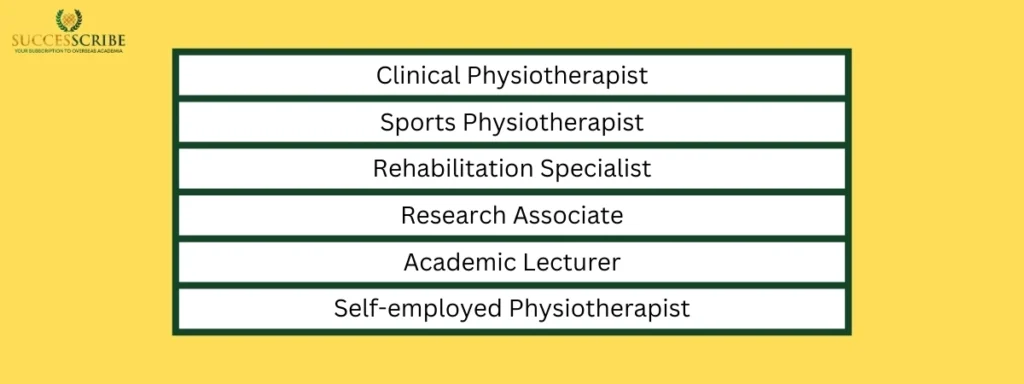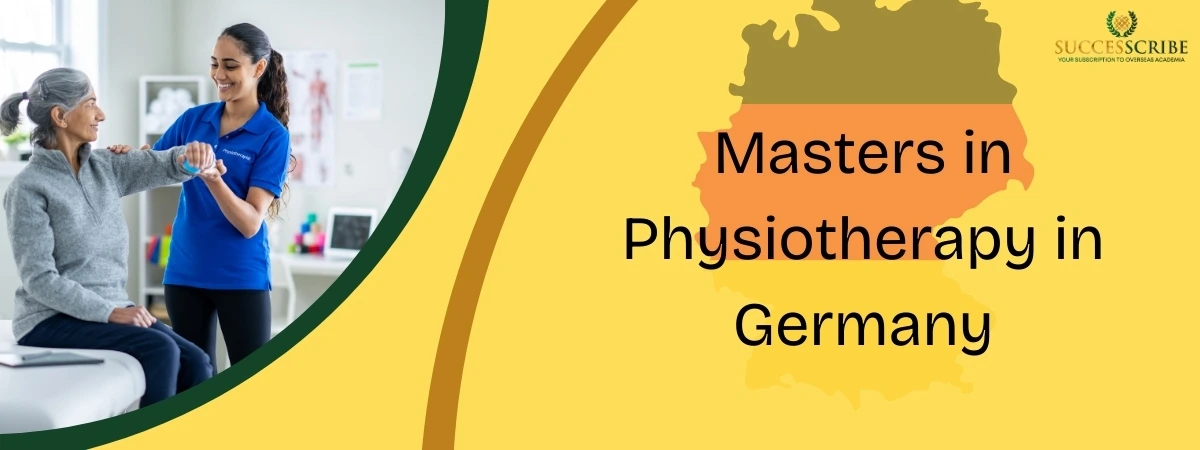Imagine stepping into a country where education costs less than €400 a semester, yet healthcare ranks among the top 15 in the world. With a nationwide shortage of 10,000 physiotherapists and over 21% of the population crossing 67 years by 2030, the demand for specialists has never been greater. A Masters in Physiotherapy in Germany isn’t just a degree, it’s your gateway to world-class research, salaries starting at €38,000 annually, and an 18-month post-study work visa that opens doors to a thriving career in Europe.
Key Highlights: Masters in Physiotherapy in Germany
- Duration: 1.5–2 years | Degree: M.Sc. in Physiotherapy / Sports / Rehab Sciences.
- Language: German (B2–C1, for clinical) & English (mostly private/applied sciences).
- Top Universities: German Sport University Cologne, Heidelberg University, TUM, Fresenius, SRH Heidelberg, Hochschule für Gesundheit Bochum.
- Eligibility: Bachelor’s in Physiotherapy (65–70%+), IELTS 6.5 / TOEFL 90+, APS (for Indians), work experience preferred.
- Costs: Public – almost free (only €150–€350 per semester); Private – €5,000–€20,000/year; Living – €950–€1,400/month.
- Scholarships: DAAD, Erasmus+, Deutschlandstipendium, Friedrich Ebert, KAS, Heinrich Böll.
- Careers: Clinical & Sports Physiotherapist, Rehab Specialist, Researcher, Lecturer; salaries €38,000–€55,000/year.
- Post-Study: 18-month job-seeking visa → EU Blue Card → PR in 33 months (21 with B1 German).
- Why Germany? 10,000+ physiotherapist shortage, world-class healthcare, affordable study, strong career growth.
Overview of Masters in Physiotherapy in Germany
Master’s programs in physiotherapy in Germany are designed to combine theoretical knowledge, clinical practice, and research. They prepare graduates for advanced clinical roles, academic teaching, or managerial positions in healthcare.
- Duration: Typically 1.5 to 2 years (3–4 semesters).
- Degree Awarded: Master of Science (M.Sc.) in Physiotherapy, Sports Physiotherapy, Rehabilitation Sciences, or related fields.
- Program Types
- M.Sc. Physiotherapy (general physiotherapy practice).
- M.Sc. Sports Physiotherapy (focus on athletes, rehabilitation, sports injuries).
- M.Sc. Rehabilitation Sciences (neuro, cardio-pulmonary, orthopedic rehab).
- M.Sc. Health Sciences with specialization in Physiotherapy (interdisciplinary approach).
- Mode of Instruction:
- English-taught programs (common in private universities, some applied sciences universities).
- German-taught programs (more common at public universities). Students need at least B2 proficiency in German
- Structure:
- Coursework includes advanced modules in clinical practice, neurology, musculoskeletal sciences, sports therapy, research methods, and evidence-based practice.
- Many programs require internships in hospitals or rehabilitation centers.
- A research thesis is mandatory in the final semester.
What master’s degrees in physiotherapy exist in Germany?

Whether you choose clinical practice or advanced research, a Masters in Physiotherapy in Germany opens pathways to highly specialized fields like neurorehabilitation, sports physiotherapy, and therapeutic sciences. There are two broad categories you’ll encounter:
1. Direct MSc / Master of Science in Physiotherapy (or Clinical Physiotherapy)
These are academic master’s that deepen clinical, scientific and research competence in physiotherapy. They may be labelled MSc Physiotherapy, Master of Physiotherapy, or MSc in Rehabilitation/Clinical Health. A few private and applied sciences universities run explicitly titled MSc Physiotherapy programs.
2. Related Master’s Specializations
Many German universities offer MSc programs in Sports Physiotherapy, Neurorehabilitation, Rehabilitation Science or Therapeutic Sciences – these are functionally very similar for physiotherapists wishing to specialise or move into research/management. Fresenius University and SRH University are practical examples of institutions offering specialised master’s in the therapeutic/physiotherapy field.
Are physiotherapists regulated in Germany? Do you need recognition to work?
Yes, a physiotherapist is a regulated profession in Germany. To work and legally use the protected title “Physiotherapeut / Physiotherapeutin” you must either:
- Obtain a state recognition (Anerkennung) of your foreign professional qualification, or
- Hold a German training qualification, or If you graduate with a German degree that includes the state-recognised practical qualification, that may automatically give you the title (depending on the program).
- The official German recognition portal confirms that recognition/authorisation is required for the protected title and indicates the process and responsible authorities vary by federal state. For international graduates with foreign degrees, an equivalence check and additional requirements (e.g., language, aptitude tests, adaptation training) may be imposed.
If your aim is to study in Germany and then practice clinically, you must plan for the recognition/licensing step after (or during) your master’s: this includes presenting transcripts, vocational training proof (if your bachelor was vocational), and meeting language/clinical competency expectations.
Top Universities Offering Master’s Programs in Physiotherapy in Germany
Unlike fields such as engineering or business, physiotherapy programs at the Master’s level in Germany are more specialized and are offered by a limited number of universities. Some focus on sports physiotherapy, while others on rehabilitation sciences or health sciences with physiotherapy specializations.
1. German Sport University Cologne (Deutsche Sporthochschule Köln)
| Program | Master of Science (M.Sc.) in Sports Physiotherapy |
| Duration | 2 years (4 semesters) |
| Language | Primarily German (some modules in English; requires German proficiency, B2/C1) |
| Tuition Fees | No tuition fees; semester contribution €320 per semester (includes public transport ticket). |
2. Fresenius University of Applied Sciences (Hochschule Fresenius)
| Program | M.Sc. in Sports Physiotherapy |
| Duration | 2 years (4 semesters) |
| Language | English |
| Tuition Fees | Around €5,000–€6,000 per semester |
3. Heidelberg University (Universität Heidelberg)
| Program | M.Sc. in Health and Rehabilitation Sciences (Physiotherapy specialization) |
| Duration | 2 years |
| Language | German (requires C1 German proficiency) |
| Tuition Fees | No tuition fees for EU/EEA; non-EU students €1,500 per semester; semester contribution €180 |
4. Technical University of Munich (TUM)
| Program | MSc Sport and Exercise Science |
| Duration | 2 years |
| Language | English and German (mixed; some courses in English, thesis can be in English) |
| Tuition Fees | €15,00 per year |
5. SRH University Heidelberg (Private)
| Program | M.Sc. in Applied Health Sciences with focus on Physiotherapy & Rehabilitation |
| Duration | 2 years |
| Language | English (select programs) or German |
| Tuition Fees | €9,000–€12,000 per year |
6. Hochschule für Gesundheit (University of Applied Health Sciences, Bochum)
| Program | MSc Applied Health Science |
| Duration | 2 years (4 semesters) |
| Language | German |
| Tuition Fees | No tuition fees; semester contribution €320 |
Eligibility Requirements for Master’s in Physiotherapy in Germany
To enroll in a Masters in Physiotherapy in Germany, international students, particularly those from India, must meet several academic, linguistic, and document-based prerequisites:
| Requirement | Details |
| Educational Qualification | Bachelor’s degree in Physiotherapy, Physical Therapy, or closely related field (usually 3–4 years, equivalent to 180–240 ECTS). Some universities may accept B.Sc. in Sports Science, Rehabilitation, or Medicine with relevant coursework. |
| Minimum Academic Performance | At least 65–70% (or 2.5 on German GPA scale) in Bachelor’s degree. Some competitive universities may require higher grades. |
| Language Proficiency – English | IELTS (6.5–7.0) or TOEFL iBT (90–100). |
| Language Proficiency – German | Goethe Certificate – B1, TestDaF (TDN 4 in all sections) or DSH-2/DSH-3 |
| Work Experience | 1–2 years of clinical/research experience in physiotherapy is preferred (not mandatory at all universities). |
| Application Documents | Academic transcripts, APS Certificate, degree certificate, CV, Statement of Purpose (SOP), Letters of Recommendation (2–3), and proof of language proficiency. |
| Visa Requirement | Valid German Student Visa with proof of financial resources (blocked account approx. €11,904 per year |
Application Timeline
| Step | Timeline (Approx.) |
| Start Researching Universities | 10–12 months before intake |
| Take Language Tests (IELTS/TestDaF) | 9–10 months before |
| Apply for APS Certificate (Indian students) | 8–9 months before |
| Application Submission | Winter Intake: April–JulySummer Intake: October–January |
| Offer Letter | 1–3 months after application |
| Apply for Student Visa | 3–4 months before semester start |
| Travel to Germany | 1–2 weeks before classes begin |
Suggested Post: Germany student visa rejection reasons
📝 Takes Only 2 Minutes!
Fill a quick form and get FREE Counselling from Germany study experts
🎓 Get FREE Counselling
Fill in your details and our experts will contact you within 24 hours
Curriculum & Specializations in Masters in Physiotherapy in Germany

The Master’s in Physiotherapy in Germany is designed to combine advanced theoretical knowledge, clinical practice, and research training, preparing graduates to work in diverse healthcare settings. While the exact curriculum may differ across universities, most programs follow a structured model that emphasizes both evidence-based practice and patient-centered care.
Core Curriculum
Students usually study the following areas during their program:
- Advanced Anatomy & Physiology – in-depth study of human body systems and functions.
- Pathophysiology & Clinical Diagnostics – understanding complex health conditions affecting mobility.
- Evidence-Based Physiotherapy – applying research findings to clinical decision-making.
- Rehabilitation Sciences – strategies for restoring function post-injury, surgery, or chronic illness.
- Neurological Rehabilitation – treatment of patients with stroke, Parkinson’s, or multiple sclerosis.
- Orthopedic & Musculoskeletal Physiotherapy – therapy for joint, muscle, and bone-related disorders.
- Sports Physiotherapy – prevention, treatment, and performance optimization for athletes.
- Cardio-Pulmonary Physiotherapy – techniques for patients with respiratory or cardiac conditions.
- Research Methodology & Biostatistics – training in academic writing, clinical trials, and data analysis.
Specializations Available
Some universities in Germany allow students to specialize in particular branches of physiotherapy during their Master’s studies. Common specializations include:
- Sports Physiotherapy – focusing on injury prevention and rehabilitation in athletes.
- Manual Therapy – advanced techniques for musculoskeletal conditions.
- Neurological Physiotherapy – rehabilitation of patients with central or peripheral nervous system disorders.
- Pediatric Physiotherapy – therapy for children with developmental delays, congenital disorders, or physical disabilities.
- Geriatric Physiotherapy – managing mobility and independence issues in elderly patients.
- Occupational & Workplace Health – physiotherapy approaches for workplace ergonomics and injury prevention.
- Research & Academia – preparing for doctoral studies or careers in teaching and research.
Cost of Studying Master’s in Physiotherapy in Germany
Germany is renowned for its affordable higher education, especially compared to many Western countries. Here’s a breakdown:
Tuition and University Fees
| University Type | Tuition Fees (per year) |
| Public Universities | Mostly no tuition fees; you only pay a semester contribution of €150–€350. |
| Private Universities | Can cost anywhere from €5,000 to €20,000 annually, depending on the institution and program. |
| Non-EU Public Fees (some states) | In states like Baden-Württemberg, non-EU students may have to pay an extra €1,500 per semester. |
Living Expenses for Students
| Expense Category | Average Monthly Cost (€) | Annual Cost (€) |
| Rent (student dorm/private flat) | 350 – 600 | 4,200 – 7,200 |
| Food & Groceries | 200 – 300 | 2,400 – 3,600 |
| Health Insurance (mandatory) | 120 – 130 | 1,440 – 1,560 |
| Transportation (public) | 49 – 80 | 588 – 960 |
| Utilities & Internet | 100 – 150 | 1,200 – 1,800 |
| Personal Expenses (leisure, books, clothing) | 100 – 200 | 1,200 – 2,400 |
| Total Estimated Cost | 950 – 1,400 | 11,208 – 16,000 |
Scholarships for Masters in Physiotherapy in Germany
International students, including Indians, can reduce costs with scholarships.
| Scholarships | Provider | Amount / Benefits | Eligibility Highlights |
| DAAD Scholarships | German Academic Exchange Service | €861/month + travel + insurance | Strong academics, research potential |
| Erasmus+ | European Commission | Tuition + €850–1,200/month stipend | For students in EU-linked exchange/master’s programs |
| Deutschlandstipendium | German Government + private sponsors | €300/month (usually 2 semesters) | Merit-based; open to all nationalities |
| Friedrich Ebert Stiftung | Political foundation | Up to €850/month + allowances | Social engagement, good academic record |
| Konrad-Adenauer-Stiftung (KAS) | Political foundation | €850/month + travel + family allowances | Leadership potential, social/political interest |
| Heinrich Böll Stiftung | Green Foundation | €934/month + research support | Academic excellence + social commitment |
Job Opportunities After Master’s in Physiotherapy in Germany

With an aging population and a rising demand for healthcare experts, a Masters in Physiotherapy in Germany is your ticket to high-demand careers in clinics, sports, and research:
Common Job Roles and Salaries After Masters in Physiotherapy in Germany
| Job Role | Average Salary (per month, €) | Details |
| Clinical Physiotherapist | 2,500 – 3,200 | Work in hospitals, rehabilitation centers, private clinics |
| Sports Physiotherapist | 3,000 – 4,000 | With clubs, athletes, sports institutes |
| Rehabilitation Specialist | 2,800 – 3,500 | For patients recovering from surgeries, strokes, accidents |
| Research Associate | 2,600 – 3,400 | Universities, medical research centers |
| Academic Lecturer | 3,500 – 4,500 | Teaching at applied sciences universities |
| Self-employed Physiotherapist | 3,000 – 5,000+ (varies) | Private practice (after licensing recognition) |
Suggested Post: Jobs after masters in Germany
Job Market Trends
- Shortage of physiotherapists: Germany currently faces a gap of 10,000 physiotherapists nationwide.
- Aging society: By 2030, 21% of Germany’s population will be over 67, boosting demand for rehab and physiotherapy.
- Sports & fitness industry growth: Professional clubs, Olympic training centers, and private gyms employ physiotherapists.
- Salary Outlook: Starting salaries are modest, but increase significantly with specialization (neurology, sports, manual therapy).
Post-Study Work Opportunities & Visa Pathways

Germany has one of the most student-friendly immigration systems in Europe, allowing international graduates, including physiotherapists, to stay, work, and eventually settle.
1. Post-Study Work Visa (18 Months)
| Step | Details |
| Eligibility | Must have successfully completed a Master’s degree in Germany. |
| Duration | 18 months (1.5 years) job-seeking visa. |
| Work Rights | Graduates can take up any job (part-time or full-time) during this period to support themselves while searching for a physiotherapy-related position. |
| Conversion | Once a job relevant to physiotherapy is found, you can apply for an EU Blue Card or a Residence Permit for Qualified Professionals. |
2. Recognition of Qualifications (Anerkennung)
Physiotherapy is a regulated healthcare profession in Germany. This means international physiotherapy degrees (even Master’s) must be officially recognized before full clinical practice rights are granted.
| Requirement | Details |
| Authority | Local health authority (Gesundheitsamt) of the federal state where you apply. |
| Process | Degree comparison with German standards. If gaps exist, applicants may need to complete an adaptation period (Anpassungslehrgang) or pass a knowledge test (Kenntnisprüfung). |
| Outcome | Issuance of a professional license (Berufserlaubnis or full Approbation) to work as a physiotherapist. |
| Language Requirement | At least B2 German (sometimes C1) for clinical practice. |
Without recognition, international physiotherapists can still work in research, academia, or sports science, but not in clinical patient care.
3. Pathway to Permanent Residency
| Step | Timeline | Details |
| EU Blue Card | Immediate after job contract with salary threshold (€45,300/year; €41,041/year for shortage professions like healthcare). | Provides fast-track to permanent residency. |
| Permanent Residency (Niederlassungserlaubnis) | After 33 months of working on an EU Blue Card (or 21 months with B1 German proficiency). | Grants lifelong residency and work rights in Germany. |
| Citizenship | After 5–8 years of residence (depending on integration & language level). | Dual citizenship reforms (2024) make it easier for foreigners to apply. |
Suggested Post: Jobs and salary after MBA in Germany
Language of instruction for Physiotherapy in Germany – German vs English
- Most clinical physiotherapy programs (especially those that include patient contact) are taught in German or require strong German proficiency (usually B2–C1) because of patient communication and clinical placements. Expect many clinical placements and local internships to require German.
- Some specialised master’s (sports physiotherapy, research-oriented rehabilitation science) are available in English, often at private universities or specific applied-science institutions. These may require IELTS/TOEFL (typical minimum IELTS 6.0–6.5) for non-native English speakers. Always check the exact language requirements on the program page
If you plan to work clinically in Germany after graduation, invest in German language training early, reaching at least B2 (CEFR) and ideally C1 will improve your employability and speed recognition.
Conclusion
Germany offers more than just education; it offers a future. With tuition fees at public universities as low as €250–€400 per semester and living costs averaging €934 per month, it is one of the most affordable study destinations in Europe. Choosing a Masters in Physiotherapy in Germany means stepping into a system where healthcare professionals are in high demand, salaries range from €38,000–€55,000 annually, and graduates enjoy an 18-month post-study work visa.
FAQs
Is it true that all Master’s programs in Germany are completely free?
1. Public universities do not charge tuition fees, but students must pay a semester contribution (€250 – €400 per semester).
2. Private universities charge tuition ranging from €5,000 – €10,000 per year.
3. Living expenses (€934–€1,000 per month) must be covered separately.
Do I need to know German if I choose an English-taught program?
While admission may not require German, internships, clinical placements, and patient interactions demand at least B1 level German.
Employers in Germany strongly prefer physiotherapists with good German skills.
Can I get direct admission without the APS certificate (for Indian students)?
Since November 2022, APS Certificate is mandatory for Indian students to apply to German universities and for student visas. Without it, applications will be rejected.
Is it true that Germany doesn’t recognize Indian Bachelor of Physiotherapy (BPT) degrees?
Indian BPT degrees are generally recognized if they are from UGC/NAAC approved universities. However, applicants must check their degree status in the Anabin database. In rare cases, a bridging course or additional documents may be required.
Is it very difficult for international students to get into physiotherapy master’s programs in Germany?
While competition is higher for public universities, private universities and universities of applied sciences are more flexible. Good academic records (60–70%+), strong SOP, and relevant work experience can significantly improve chances.
Related Post
Masters in petroleum engineering in Germany
Masters in embedded systems in Germany
Part time jobs in Germany for students
IELTS score for German public universities















